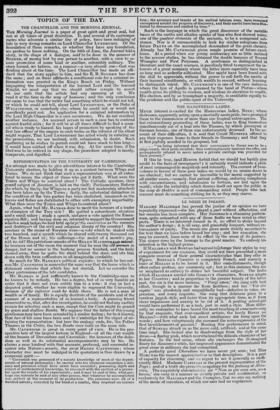THE CHANCELLOR AND THE MORNING JOURNAL. TOPICS OF THE DAY.
THE Morning _Journal is a paper of great spirit and great zeal, but not at all times of great discretion. • It, and several of its contempo- raries who advocate a similar line of policy, have been indulging of late in very strong remarks on Lord Chancellor LYNDHURST. Of the foundation of these remarks, or whether they have any foundation, we profess to know. nothing. On the 30th of June, the Journal told a story, in the shape of a dialogue, said to be done in the manner of STERNE, of money lent by one person to another, with a view to se- cure promotion of some kind or another, ostensibly military. The story turned, we believe, on a rumour—a very absurd one—that was floating about at the time. The Lord Chancellor has made an affi-; davit that the story applies to him, and Sir E. B. SUGDEN has done the same ; and on these affidavits a conditional rule for a criminal in- formation was granted in the King's Bench on Friday. Without impugning the interpretation of the learned Lord and the learned Knight, we must say that we should rather scruple • to assert on our oath that the article had any meaning at all. We read it at the time in the way of business ; and the only conclusion we came to was that the writer had something which he would not tell, or which he could not tell, about Lord LYNDHURST, or the Duke of WELLINGTON, or somebody else, whom he could not or would not specifically point out. An application for a criminal information by the Lord High Chanceller is a rare occurrence. We do not recollect another instance. An accused person in such a case has to contend against fearful odds ; for it will be at all times difficult to find a coun- sel who is ready to hazard his hopes of promotion by speaking; of the first law officer of the empire in such terms as the interest of his client might require. That Lord LYNDHURST has acted wisely in entering on the prosecution, we are inclined, with submission, to doubt. Such spattering as he wishes to punish could not have stuck to him long— it would have rubbed off when it was dry. At the same time, if the libel was to be noticed in any shape, the procedure adopted is manly, temperate, and dignified.


















 Previous page
Previous page